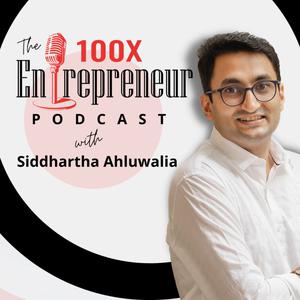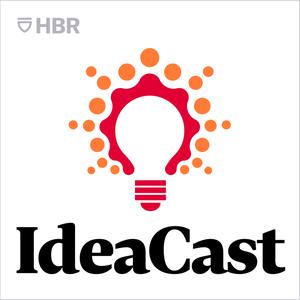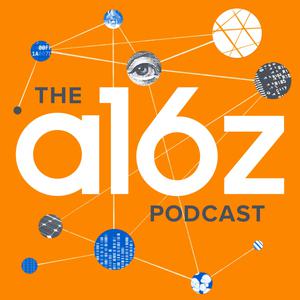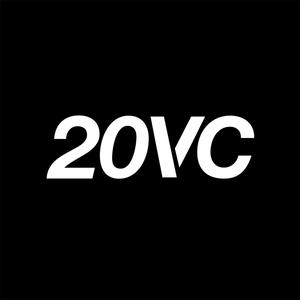
100x Entrepreneur
Siddhartha Ahluwalia
100x Entrepreneur is a podcast series hosted by Siddhartha Ahluwalia, a 2x founder, and VC & Startup Business Development Manager, South at Amazon Web Services (AWS).Siddhartha brings insightful conversations from successful entrepreneurs and VCs, helping you grow 100x of yourself.100x Entrepreneur Podcast is ranked among the top 15 Business podcasts in Asia recognized by Tech In Asia.
- 57 minutes 37 secondsHow Trade Wars Reshape Countries and The Future of India-US Relations with Matein Khalid
These farmers lost around $1.72B in a single morning.
It was all because of tit-for-tat import taxes.
But what really happened and who were these farmers?
It all started when Donald Trump walked into the White House in January 2017, promising to take on what he called “unfair trade” with China.
March 2018, Trump slapped $50 billion in tariffs on Chinese goods, aiming straight at the heart of China’s industrial ambitions—its "Made in China 2025" strategy.
This marked the start of the trade war.
April, 2018, Beijing hit where it hurt—Trump’s voter base.
It announced a 25% tariff on American soybeans, cars, and chemicals.
And it wasn’t just any random pick. China was the biggest buyer of U.S. soybeans, importing 60% of all U.S. exports.
The markets reacted immediately and soybean prices went into free fall, erasing $1.72 billion in market value by morning.
Farmers who relied on China as their primary buyer suddenly found themselves staring at massive losses.
In this episode of The NEON Show, Matein Khalid, a seasoned financial advisor, shares his fascinating four-decade journey. Starting as a teenage trader in Dubai, he later advised corporate boards and family offices in the UAE, Saudi Arabia, and the US. Matein talks about global trade, geopolitics, and economic strategies, providing insights on the US-China trade war, Trump's economic policies, and shifting global power dynamics.
Check out Matein's writings here: https://www.linkedin.com/in/mateinkhalid/
Timestamps
00:00 – Trailer
01:17 – Introduction
02:38 – Matein’s early trading and wealth management
04:37 – Trump’s unpredictability in geopolitics
06:04 – Rise of China hawks in US policy
07:40 – India’s edge in US-China tensions
09:50 – Starlink vs. Indian telecoms
10:30 – US Steel and political influence
12:51 – China’s slowdown and unemployment
19:02 – US K-shaped recovery and inequality
21:46 – US debt crisis and risks
26:41 – Adani controversy’s geopolitical angle
31:17 – Possible end to Russia-Ukraine war
33:55 – Israel weakens Iran’s air defense
37:35 – Trump’s isolationist policies
41:02 – Trade and capital flows in forex
42:39 – South Korea’s political turmoil
48:04 – Syria’s proxy wars reignite
52:04 – Modi’s UAE visit boosts financial flows
54:34 – India’s entrepreneurial spirit
------------
Hi, I am your host Siddhartha! I have been an entrepreneur from 2012-2017 building two products AddoDoc and Babygogo. After selling my company to SHEROES, I and my partner Nansi decided to start up again. But we felt unequipped in our skillset in 2018 to build a large company. We had known 0-1 journeys from our startups but lacked the experience of building 1-10 journeys.
Hence was born The Neon Show (Earlier 100x Entrepreneur) to learn from founders and investors, the mindset to scale yourself and your company. This quest still keeps us excited even after 5 years and doing 200+ episodes.
We welcome you to our journey to understand what goes behind building a super successful company. Every episode is done with a very selfish motive, that I and Nansi should come out as a better entrepreneur and professional after absorbing the learnings.
-------------
Check us out on:
Website: https://neon.fund/
Instagram: https://www.instagram.com/theneonshoww/
LinkedIn: https://www.linkedin.com/company/beneon/
Twitter: https://x.com/TheNeonShoww
Connect with Siddhartha on:
LinkedIn: https://www.linkedin.com/in/siddharthaahluwalia/
Twitter: https://x.com/siddharthaa7
------
This video is for informational purposes only. The views expressed are those of the individuals quoted and do not constitute professio22 December 2024, 10:30 pm - 53 minutes 28 secondsLessons From 25 Years of Investing with Boris Wertz, Founder and GP, Version One Ventures
In this episode of the NEON Show, Boris Wertz, a renowned venture capitalist and entrepreneur, shares his extensive journey through the tech and investment world over the past 25 years. From founding a company that was acquired by Amazon to becoming an investor and backing emerging fund managers globally, Boris offers a rich and unique perspective on the evolution of venture capital.
Timestamp
00:00 - Trailer
01:40 - Introduction and background
03:17 - Journey as a venture capitalist
04:49 - Boris’s first investments in emerging managers
07:32 - Why is Boris so focused on the Indian market?
09:48 - Fund sizes and strategy
13:03 - VC returns and liquidity
16:06 - Boris’s key learnings from successes and failures
21:20 - Themes like AI, crypto, and climate tech
25:00 - India as the next frontier
28:50 - Challenges Indian entrepreneurs face
35:46 - Boris’s concept of minimum viable fund
39:10 - Cycles in venture capital
43:46 - A16z board partner program
48:45 - Evolution of venture capital mindsets
-------------
Hi, I am your host Siddhartha! I have been an entrepreneur from 2012-2017 building two products AddoDoc and Babygogo. After selling my company to SHEROES, I and my partner Nansi decided to start up again. But we felt unequipped in our skillset in 2018 to build a large company. We had known 0-1 journeys from our startups but lacked the experience of building 1-10 journeys.
Hence was born The Neon Show (Earlier 100x Entrepreneur) to learn from founders and investors, the mindset to scale yourself and your company. This quest still keeps us excited even after 5 years and doing 200+ episodes.
We welcome you to our journey to understand what goes behind building a super successful company. Every episode is done with a very selfish motive, that I and Nansi should come out as a better entrepreneur and professional after absorbing the learnings.
-------------
Check us out on:
Website: https://neon.fund/
Instagram: https://www.instagram.com/theneonshoww/
LinkedIn: https://www.linkedin.com/company/beneon/
Twitter: https://x.com/TheNeonShoww
Connect with Siddhartha on:
LinkedIn: https://www.linkedin.com/in/siddharthaahluwalia/
Twitter: https://x.com/siddharthaa7
------
This video is for informational purposes only. The views expressed are those of the individuals quoted and do not constitute professional advice.15 December 2024, 10:30 pm - 1 hour 4 minutesIndia's Silent Economic Revolution with Ashok Lahiri, Former Chief Economic Advisor
In this episode of the NEON Show, Ashok K. Lahiri, a leading economist and former Chief Economic Advisor, talks about India’s economic journey and the changes in its tax system. Lahiri shares why India has fallen behind some countries, pointing to missed opportunities in education, healthcare, and infrastructure. He also highlights the importance of India’s democracy and federal system in shaping its progress.
Check out Ashok K. Lahiri’s book, India in search of glory, https://www.amazon.in/India-Search-Glory-Political-Calculus/dp/067009207X/
Time Stamp
00:00 - Trailer
01:27 - Introduction of Ashok K. Lahiri
03:07 - Ashok’s upbringing and early education in economics
05:27 - Why Ashok went abroad and how UPSC got him back
08:33 - Are you satisfied with GDP growth
12:42 - Education and health lead to long-term economic growth
15:27 - The right to information is important but debatable
18:27 - The govt went overboard in the 70s
20:37 - What happened to West Bengal
24:32 - Improvement will come with liberal society
25:57 - Troubles of taxations
29:42 - Taxing in the Indira Gandhi era
33:27 - People once informed take the right decision
37:32 - Chicken and egg in politics
39:27 - Why India is on the right track
43:27 - Challenges faced by Bangladesh and lessons for India
47:32 - India: union of states
52:07 - Struggle of India to get where it is right now
58:32 - Why we can't blame our ancestors
01:01:52 - Importance of transportation and Connectivity
------
Hi, I am your host Siddhartha! I have been an entrepreneur from 2012-2017 building two products AddoDoc and Babygogo. After selling my company to SHEROES, I and my partner Nansi decided to start up again. But we felt unequipped in our skillset in 2018 to build a large company. We had known 0-1 journeys from our startups but lacked the experience of building 1-10 journeys.
Hence was born The Neon Show (Earlier 100x Entrepreneur) to learn from founders and investors, the mindset to scale yourself and your company. This quest still keeps us excited even after 5 years and doing 200+ episodes.
We welcome you to our journey to understand what goes behind building a super successful company. Every episode is done with a very selfish motive, that I and Nansi should come out as a better entrepreneur and professional after absorbing the learnings.
------
Check us out on:
Website: https://neon.fund/
Instagram: https://www.instagram.com/theneonshoww/
LinkedIn: https://www.linkedin.com/company/beneon/
Twitter: https://x.com/TheNeonShoww
Connect with Siddhartha on:
LinkedIn: https://www.linkedin.com/in/siddharthaahluwalia/
Twitter: https://x.com/siddharthaa7
------
This video is for informational purposes only. The views expressed are those of the individuals quoted and do not constitute professional advice.8 December 2024, 10:30 pm - 50 minutes 23 secondsAlok Sama, Former SOFTBANK CFO on Working With the Visionary Masayoshi Son
The world’s largest tech-focused venture capital fund. And the man behind it is Masayoshi Son, often referred to as Masa.
At 16, Masa moved to California, drawn by the entrepreneurial spirit of Silicon Valley.
Before he turned 21 years old, Son sold his first company— a multilingual translator bought by Sharp for about $1 million.
Masa returned to Japan and founded SoftBank as a software distribution company.
In 1995, Masa made one of his first bold investments— a $100 million for a 30% stake in Yahoo.
In 1999, Masa made an even bigger move, investing $20 million in Alibaba, a year-old e-commerce startup.
Over 23 years, that investment turned into a $72 billion gain, making it one of the most successful tech investments ever.
In 2014, he brought in Alok Sama who had a key role in some of SoftBank’s biggest successes, like the $32 billion acquisition of ARM and the $59 billion Sprint-T-Mobile merger.
In this episode of the NEON Show, Alok Sama, takes us behind the scenes of his journey at SoftBank, where he played a crucial role in shaping the group's global investments and strategy. He shares insights into working alongside Masa, managing the Vision Fund, and the challenges of betting on transformative entrepreneurs.
Check out Alok Sama’s book, The Money Trap: Lost Illusions Inside the Tech Bubble - https://www.amazon.in/Money-Trap-Alok-Sama/dp/9361134337
Timestamps
0:00 - Trailer
1:13 - Alok’s career, and Money Trap
2:20 - Transition to SoftBank and the motivation behind Money Trap
3:29 - what Alok thinks about Nikesh Arora and Masayoshi Son
5:07 - Masayoshi Son’s visionary mindset and why Alok admired him
6: 40 - Why Alok values intellectual curiosity in people and himself
7:50 - Alok’s entrepreneurial journey post-Morgan Stanley
09:30 - The meaning behind Money Trap and reflections on money
12:30 - Masa Son’s struggle growing up and the freemium coffee model
17:00 - Alok’s last year at SoftBank and decision to leave
18:08 - Alok’s relationship with Nikesh Arora
20:10 - Delhi roots, and family time
21:20 - Alok's view on vulnerabilities
27:20 - Masa Son’s character and commitment to backing entrepreneurs fully
31:10 - Valuation lessons in technology investments
34:20 - Son’s early bets on AI and his timing challenges
37:30 - Joined SoftBank to impress Alok’s teenage son and connect with family
40: 10 - experience of writing a book
43:10 - Masa’s thesis on India
-----
Hi, I am your host Siddhartha! I have been an entrepreneur from 2012-2017 building two products AddoDoc and Babygogo. After selling my company to SHEROES, I and my partner Nansi decided to start up again. But we felt unequipped in our skillset in 2018 to build a large company. We had known 0-1 journeys from our startups but lacked the experience of building 1-10 journeys.
Hence was born The Neon Show (Earlier 100x Entrepreneur) to learn from founders and investors, the mindset to scale yourself and your company. This quest still keeps us excited even after 5 years and doing 200+ episodes.
We welcome you to our journey to understand what goes behind building a super successful company. Every episode is done with a very selfish motive, that I and Nansi should come out as a better entrepreneur and professional after absorbing the learnings.
-----
Check us out on:
Website: https://neon.fund/
Instagram: https://www.instagram.com/theneonshoww/
LinkedIn: https://www.linkedin.com/company/beneon/
Twitter: https://x.com/TheNeonShoww
Connect with Siddhartha on:
LinkedIn: https://www.linkedin.com/in/siddharthaahluwalia/
Twitter: https://x.com/siddharthaa7
-------------
This show is for informational purposes only. The v5 December 2024, 10:30 pm - 1 hour 13 minutesIndia's Road to $10 Trillion Economy with Subhash Garg Former Secretary of Economic Affairs
Why does 50% of India’s workforce remain in agriculture while the U.S. has just 2%?
Despite all those hands in the soil, the sector contributes just 15-18% to the GDP.
While countries like the U.S. and Europe shifted quickly from agriculture to industry, India's progress was pretty slow. So, is it too late for India to catch up and move on from agriculture?
Although India did build textile mills and steel plants, its industrialization lagged behind faster-growing Asian economies like Japan, South Korea, and China, which aggressively pursued manufacturing.
So, what happened?
Well, India’s focus remained on agriculture, missing the chance to build a strong industrial base that could absorb its large agricultural workforce. But there’s a new hurdle—manufacturing isn’t the job creator it once was.
Experts like Subhash Garg argue India may have missed the industrialization train. With automation reducing labour needs, ramping up manufacturing might not create enough jobs for India’s vast workforce.
In this episode of The Neon Show, Subhash Garg, former Secretary of Economic Affairs, shares his unique perspective on India's economic ambitions and the journey toward the $10 Trillion Dream.
Check out Subhash Garg's book, The Ten Trillion Dream Dented, https://www.amazon.in/Ten-Trillion-Dream-Dented-2019-2024/dp/0143467433
Timestamps
00:00 - Trailer
01:25 - Subhash Garg’s background in economic affairs
03:27 - Why has India's "10 Trillion Dollar Dream" dented
10:04 - India’s current GDP
12:50 - Need to shift labour from agriculture to high-value sectors
16:48 - Why India missed industrialisation
20:26 - The global manufacturing train left—and India missed it
21:55 - Why should you invest in services for real growth
26:55 - Sports, gaming, and entertainment are hidden gems for rural jobs
29:54 - Why is agriculture unreformed
31:34 - The impact of subsidies: is it a dead-end for farmers?
36:47 - Garg explains GDP with the “potato chip” example
42:42 - Why is farmers’ share of the final product small
47:10 - India’s manufacturing needs a tech boost
48:22 - Why India’s PLI schemes aren’t hitting their targets
52:58 - How India’s service sector thrived due to minimal regulation
1:01:57 - Garg’s positive take on brain drain
1:10:10 - Millionaires on the move
1:11:50 - Support for short sellers as market correctors
1:13:12 - Announcement of Garg's book, expected in October
-------------
Hi, I am your host Siddhartha! I have been an entrepreneur from 2012-2017 building two products AddoDoc and Babygogo. After selling my company to SHEROES, I and my partner Nansi decided to start up again. But we felt unequipped in our skillset in 2018 to build a large company. We had known 0-1 journeys from our startups but lacked the experience of building 1-10 journeys.
Hence was born The Neon Show (Earlier 100x Entrepreneur) to learn from founders and investors, the mindset to scale yourself and your company. This quest still keeps us excited even after 5 years and doing 200+ episodes.
We welcome you to our journey to understand what goes behind building a super successful company. Every episode is done with a very selfish motive, that I and Nansi should come out as a better entrepreneur and professional after absorbing the learnings.
-------------
Check us out on:
Website: https://neon.fund/
Instagram: https://www.instagram.com/theneonshoww/
LinkedIn: https://www.linkedin.com/company/beneon/
Twitter: https://x.com/TheNeonShoww
Connect with Siddhartha on:
LinkedIn: https://www.linkedin.com/in/siddharthaahluwalia/
Twitter: https://x.com/siddharthaa7
-------------
This video is for informational purposes on21 November 2024, 10:30 pm - 1 hour 51 secondsHow Policybazaar Became No. 1: Yashish Dahiya on Execution, Aspiration and Risk Taking
In India, financial security often seemed just out of reach, especially when it came to insurance. For many, insurance was complex, filled with hidden terms, and often mis-sold.
That’s exactly what happened when an engineer-turned-consultant discovered that his father had been duped by insurance agents into purchasing a policy that was both confusing and overpriced.
Instead of just shrugging it off, this experience sparked an idea: why not create a platform where people could get straightforward, honest information about insurance?
So in 2008, Yashish Dahiya, along with co-founders Alok Bansal and Avaneesh Nirjar, launched Policy Bazaar.
Today, Policy Bazaar has grown into India’s largest insurance aggregator, with an annual run rate of 100 million visitors.
In 2022, The platform accounted for 93% of online insurance sales in India, holding 25% of the country’s life insurance cover and 7% of retail health insurance cover.
In this episode of The Neon Show, Yashish Dahiya, co-founder and Chairman of Policy Bazaar, shares his journey of building India’s leading online insurance platform.
Drawing from personal experiences, including his family’s army background, Yashish explores the challenges of creating financial security for India’s middle class, when not taking risk is the biggest risk and the HUGE India opportunity.
Timestamps
00:00 - Trailer
01:18 - introducing Yashish Dahiya
02:18 - Policy Bazaar’s rise as India’s top online insurance platform
03:26 - India’s rising costs and financial aspirations
05:11 - Sanjeev Bikhchandani’s early investments in Policy Bazaar
06:43 - India’s economy as a mix of Bahrain, UK, Brazil, and Africa
07:49 - Financial inclusion across India’s diverse social structure
11:53 - Why does mass class movement happen
16:20 - Institutional strengths drive GDP
19:38 - Why Policy Bazaar outperformed its competitors
25:22 - Daily discipline and the importance of consistent execution
28:36 - How Yashish built team trust and values at Policy Bazaar
31:38 - Things changed when I got married
33:40 - Managing family life across India and the UK
36:36 - Why the value system is important
41:48 - What is stress exactly for an entrepreneur
46:18 - Sanjeev view on Policy Bazaar
49:40 - Policy Bazaar’s vision for social impact
53:58 - Consistent values pre-and post-IPO
57:33 - Why did Policy Bazaar go public
-------------
Hi, I am your host Siddhartha! I have been an entrepreneur from 2012-2017 building two products AddoDoc and Babygogo. After selling my company to SHEROES, I and my partner Nansi decided to start up again. But we felt unequipped in our skillset in 2018 to build a large company. We had known 0-1 journeys from our startups but lacked the experience of building 1-10 journeys.
Hence was born The Neon Show (Earlier 100x Entrepreneur) to learn from founders and investors, the mindset to scale yourself and your company. This quest still keeps us excited even after 5 years and doing 200+ episodes.
We welcome you to our journey to understand what goes behind building a super successful company. Every episode is done with a very selfish motive, that I and Nansi should come out as a better entrepreneur and professional after absorbing the learnings.
-------------
Check us out on:
Website: https://neon.fund/
Instagram: https://www.instagram.com/theneonshoww/
LinkedIn: https://www.linkedin.com/company/beneon/
Twitter: https://x.com/TheNeonShoww
Connect with Siddhartha on:
LinkedIn: https://www.linkedin.com/in/siddharthaahluwalia/
Twitter: https://x.com/siddharthaa7
-------------
This video is for informational purposes only. The views expressed are those of the in15 November 2024, 10:30 pm - 1 hour 50 minutesThe Story Behind India’s High Growth Years with Montek Singh Ahluwalia former Deputy Chairman Planning Commission
Ever heard of the M Document?
Montek Singh Ahluwalia, an economist in govt of India, saw that India needed to make some big changes to keep up. So, he started working on what would become the M Document.
The M Document suggested bold reforms. Many government officials thought these ideas were too radical.
Then, something unexpected happened: the M Document got into the hands of journalist Ashok Desai, who saw its potential, and gave it the now-famous name, the M Document.
Even though the document was just meant for internal review, the leak sparked public debate on how India’s economy could be modernized.
Though it didn’t lead to immediate changes, the M Document planted seeds that grew in a few years.
In this episode of the NEON Show, Montek Singh Ahluwalia, a renowned economist and former Deputy Chairman of India's Planning Commission, shares insights from his pivotal role in shaping the 1991 economic reforms and reveals the behind-the-scenes story of the influential "M document" and how it ultimately shaped India’s approach to liberalisation.
Check out Montek Singh Ahluwalia’s book, BACKSTAGE: The Story behind India’s High Growth Years, https://www.amazon.in/BACKSTAGE-Story-behind-Indias-Growth-ebook/dp/B084P4Y3VW/
Time stamps
00:00 - Introduction to Mr. Montek Singh Ahluwalia
01:04 - Early life and family’s experience post-partition
05:11 - Winning the Rhodes Scholarship
06:14 - Early career at the World Bank
07:15 - Returning to India as an economic advisor
09:02 - Washington invitation and Planning Commission role
13:02- 1991 economic reforms
18:40 - Committees for economic reform
22:00 - High import controls as an economic issue
26:34 - Challenges in policy reform
28:38 - V.P. Singh asks Montek to write the document”?
31:36 - How did the “M document" leak
38:40 - Maruthi engine block story
48:35 - SEBI and financial system reforms
58:25 - Moving past the “Tonga mindset.”
1:01:20- Why controlled imports are tax on exports
1:09:00 - How do exchange rates impact imports and exports?
1:12:04 - Discovery of Roman gold coins in South India
1:16:50 - Narayana Murthy’s import struggles
1:22:25 - Politicians should openly support beneficial policies
1:32:55 - Montek’s vision for India’s next decade
1:39:58 - Final thoughts on India’s future
-------------
Hi, I am your host Siddhartha! I have been an entrepreneur from 2012-2017 building two products AddoDoc and Babygogo. After selling my company to SHEROES, I and my partner Nansi decided to start up again. But we felt unequipped in our skillset in 2018 to build a large company. We had known 0-1 journeys from our startups but lacked the experience of building 1-10 journeys.
Hence was born The Neon Show (Earlier 100x Entrepreneur) to learn from founders and investors, the mindset to scale yourself and your company. This quest still keeps us excited even after 5 years and doing 200+ episodes.
We welcome you to our journey to understand what goes behind building a super successful company. Every episode is done with a very selfish motive, that I and Nansi should come out as a better entrepreneur and professional after absorbing the learnings.
-------------
Check us out on:
Website: https://neon.fund/
Instagram: https://www.instagram.com/theneonshoww/
LinkedIn: https://www.linkedin.com/company/beneon/
Twitter: https://x.com/TheNeonShoww
Connect with Siddhartha on:
LinkedIn: https://www.linkedin.com/in/siddharthaahluwalia/
Twitter: https://x.com/siddharthaa7
-------------
This video is for informational purposes only. The views expressed are those of the individuals quoted and do not constitute professional advice.8 November 2024, 11:30 pm - 1 hour 8 minutesSANJEEV SANYAL On India's East-West Divide, Best States & How India Works
After India’s big economic shift in 1991, each state grew at different rates—but they didn’t all get there at the same speed.
Western and southern states saw major benefits, while many in the east and north struggled to keep up. In fact, by 2021-22, the per capita income in the top five states was 3.3 times higher than in the bottom five—a clear sign of the widening divide.
So, what does this uneven growth look like?
In the 1960s, Uttar Pradesh, Maharashtra, and West Bengal were leading India's economy with contributions of 14.4%, 12.5%, and 10.5% of GDP, respectively. Today, Uttar Pradesh's share has fallen to 8.4%, and West Bengal's to 5.6%, but Maharashtra remains a top contributor.
Gujarat's share grew from 6.4% in 2000-01 to 8.1% in 2022-23, driven by strong industry and urban centres. Southern states like Karnataka, Telangana, Tamil Nadu, and Kerala now make up about 30% of India's GDP, boosted by cities like Bengaluru and Hyderabad.
In this NEON Show episode, economist and policy advisor Sanjeev Sanyal discusses India’s economic journey and why growth has been so uneven across states. He explains why some regions have surged ahead while others have lagged behind, touching on the role of anchor cities and old policies like the Freight Equalization Policy that held back Eastern states.
Time stamps
00:00 - Trailer
02:40 - Banking Reforms and Creative Destruction
03:20 - Process vs. Structural Reforms
05:33 - Bureaucratic Challenges Affect Efficiency
14:09 - Autonomous Bodies and Obsolete Institutions
16:02 - Is it time to rethink outdated National Monuments?
26:06 - What Does Data Reveal About Indian States
35:03 - Did “Freight equalization” Rob Kolkata of its Competitive edge?
36:25 - East vs. West: Is this India’s true economic divide?
37:32 - Southern and Western India's Success
42:42 - High Growth States Rely on Anchor Cities
44:01 - Reviving Kolkata and Eastern India
45:12 - Local policies that can make or break state economies.
49:11 - Tourism Has Made Sikkim and Goa Economic Stars.
53:35 - India Needs to Modernize the Shipping Sector
01:00:36 - India Needs a Healthy Clash of Ideas
------------
Hi, I am your host Siddhartha! I have been an entrepreneur from 2012-2017 building two products AddoDoc and Babygogo. After selling my company to SHEROES, I and my partner Nansi decided to start up again. But we felt unequipped in our skillset in 2018 to build a large company. We had known 0-1 journeys from our startups but lacked the experience of building 1-10 journeys.
Hence was born The Neon Show (Earlier 100x Entrepreneur) to learn from founders and investors, the mindset to scale yourself and your company. This quest still keeps us excited even after 5 years and doing 200+ episodes.
We welcome you to our journey to understand what goes behind building a super successful company. Every episode is done with a very selfish motive, that I and Nansi should come out as a better entrepreneur and professional after absorbing the learnings.
-------------
Check us out on:
Website: https://neon.fund/
Instagram: https://www.instagram.com/theneonshoww/
LinkedIn: https://www.linkedin.com/company/beneon/
Twitter: https://x.com/TheNeonShoww
Connect with Siddhartha on:
LinkedIn: https://www.linkedin.com/in/siddharthaahluwalia/
Twitter: https://x.com/siddharthaa7
-------------
Sponsor shout out
Looking to build a differentiated tech startup with a 10X better solution? Prime is the high conviction, high support investor you need. With its fourth fund of $120M, Prime actively works with star teams to accelerate building great companies. To know more, visit https://primevp.in/
-------------
This video is for informational1 November 2024, 11:30 pm - 1 hour 17 minutesGEOPOLITICS SPECIAL: Former MEA Secretary On India-US Relations, Pakistan's Decline & Bangladesh
The breakup of the Soviet Union in 1991 was a game-changer for India, shaking up its economy, defence strategy, and foreign relations.
For years, the USSR had been India’s largest trading partner, pumping in vital support through the rupee-ruble trade agreement. But then, December 25, 1991, arrived, and the Soviet Union collapsed.
While the Soviet Union’s collapse seemed like a disaster at first, it actually pushed India to evolve—fast.
In this episode of The NEON Show, a former diplomat with a 36-year career in the Indian Foreign Service, Rajiv Sikri examines India’s complex ties with neighbouring countries exploring issues like Kashmir, economic interdependence, and political dynamics. He also sheds light on the impact of global powers, especially the US and China, on India’s strategic choices.
Check out Rajiv Sikri’s book Strategic Conundrums: Reshaping India's Foreign Policy: https://www.amazon.in/Strategic-Conundrums-Reshaping-Indias-Foreign/dp/0143464574
-------------
Timestamps
00:00 -Host Siddharth Ahluwalia introduces The Neon Show.
00:43 - Pakistan, Bangladesh, Afghanistan.
01:04 - Pakistan’s economic/political issues.
05:06 -Pakistan's ties with the West, China, and the military's role.
08:40 -Kashmir conflict and India-Pakistan relations.
12:06 - Pakistan's internal political dynamics.
15:24 - Bangladesh's identity and India relations.
18:00 - India-Bangladesh economic interdependence.
26:06 - India’s strategic geographic position.
29:52 - India’s foreign policy after the Berlin Wall’s fall.
33:40 - Economic impacts and India-US relations.
37:52 - US-Russia relations and the Ukraine conflict.
42:12 - Russia-Ukraine war’s effect on India.
48:16 - US dominance and unilateral actions post-1989.
52:04 - Challenges to US hegemony.
56:00 - India-US relations amidst strategic concerns.
1:01:20 - BRICS and global multipolarity.
1:04:40 - Dollar dependency and US financial power.
1:08:20 - Concluding thoughts on India’s foreign policy.
-------------
Hi, I am your host Siddhartha! I have been an entrepreneur from 2012-2017 building two products AddoDoc and Babygogo. After selling my company to SHEROES, I and my partner Nansi decided to start up again. But we felt unequipped in our skillset in 2018 to build a large company. We had known 0-1 journeys from our startups but lacked the experience of building 1-10 journeys.
Hence was born The Neon Show (Earlier 100x Entrepreneur) to learn from founders and investors, the mindset to scale yourself and your company. This quest still keeps us excited even after 5 years and doing 200+ episodes.
We welcome you to our journey to understand what goes behind building a super successful company. Every episode is done with a very selfish motive, that I and Nansi should come out as a better entrepreneur and professional after absorbing the learnings.
-------------
Check us out on:
Website: https://neon.fund/
Instagram: https://www.instagram.com/theneonshoww/
LinkedIn: https://www.linkedin.com/company/beneon/
Twitter: https://x.com/TheNeonShoww
Connect with Siddhartha on:
LinkedIn: https://www.linkedin.com/in/siddharthaahluwalia/
Twitter: https://x.com/siddharthaa7
-------------
Sponsor shout out
Looking to build a differentiated tech startup with a 10X better solution? Prime is the high conviction, high support investor you need. With its fourth fund of $120M, Prime actively works with star teams to accelerate building great companies. To know more, visit https://primevp.in/
-------------
This video is for informational purposes only. The views expressed are those of the individuals quoted and do not constitute professional advice.27 October 2024, 1:30 am - 45 minutes 58 secondsHow Investing Legend Mark Mobius Built a Fortune in Emerging Markets
From Baker's Son to Global Investment Legend.
Mark Mobius is known as a foundational figure in emerging markets investing. He is the chairman of Mobius Emerging Opportunities Fund. Before that, he led the Templeton Emerging Markets Group for over 30 years, during which the group's assets under management grew from $100 million to over $50 billion.
In this episode of The NEON Show, Mark shares his rules for wealth creation, why India is his top investment pick, his reasons for pulling investments out of China, what keeps him at the top of his game at the young age of 87, two ways to lose money fast, and why understanding art and creativity is more important than finance when it comes to making money.
Connect with Mark Mobius
LinkedIn | Twitter
To learn more from Mark check out his The Book Of Wealth
-------------
Timestamps
00:00 - Trailer
00:00 - Early Lessons in Money & Creativity
04:13 - Becoming a Professional Student
05:43 - The Road to Mark’s First Million
08:04 - The First Emerging Markets Fund
11:03 - To Make Money Don’t Focus on It
12:38 - Making 10 Million Dollars
14:20 - Mark’s Early Investment Assets
15:56 - Power of Compounding: Reaching $100 Million
16:51 - Mark’s Success with Investing in Asia
19:22 - Why Mark is Not Bullish on China
22:44 - How Mark Invests in India
25:01 - Why Mark is Bullish on Taiwan
25:56 - Mark’s 3 Reasons to Invest in India
28:19 - When will India Surpass China?
30:51 - From Emerging Markets to Emerging Opportunities
32:37 - It’s All About Liquidity
34:27 - Mark’s Principles of Wealth Creation
35:49 - How Mark Invests in Startups
37:33 - How Not to Lose Money
38:43 - Make Friends & Learn From Them
39:38 - What Mark Learned From John Templeton
40:54 - Why Invest in Emerging Markets
42:10 - Who are the Best Political Leaders
42:50 - Why Mark Shifted to Dubai
44:02 - No Recession Anytime Soon
-------------
Hi, I am your host Siddhartha! I have been an entrepreneur from 2012-2017 building two products AddoDoc and Babygogo. After selling my company to SHEROES, I and my partner Nansi decided to start up again. But we felt unequipped in our skillset in 2018 to build a large company. We had known 0-1 journeys from our startups but lacked the experience of building 1-10 journeys.
Hence was born The Neon Show (Earlier 100x Entrepreneur) to learn from founders and investors, the mindset to scale yourself and your company. This quest still keeps us excited even after 5 years and doing 200+ episodes.
We welcome you to our journey to understand what goes behind building a super successful company. Every episode is done with a very selfish motive, that I and Nansi should come out as a better entrepreneur and professional after absorbing the learnings.
-------------
Check us out on:
Website | Instagram | LinkedIn | Twitter
Connect with Siddhartha on:
LinkedIn | Twitter
-------------
Sponsor shout out
Looking to build a differentiated tech startup with a 10X better solution? Prime is the high conviction, high support investor you need. With its fourth fund of $120M, Prime actively works with star teams to accelerate building great companies. To know more, visit https://primevp.in/
-------------
This23 October 2024, 11:30 pm - 1 hour 30 minutesIndia Can be a $55 Trillion Economy by 2047 with Krishnamurthy Subramanian Executive Director IMF
In 1947, India gained independence with a per capita of around $2000(adjusted with inflation).
But over the next few decades, the govt adopted socialist policies, emphasising self-sufficiency and state-led development. As a result, India’s economy grew at a slower pace of 3.5% per year.
In 1991, India introduced a series of reforms— liberalisation, privatisation, and globalisation. India’s growth rate picked up, and by 2023, India’s per capita GDP was back to $2,600, driven by market-friendly policies and increased global trade.
In this episode of the NEON Show, Krishnamurthy Subramanian, Executive Director at the IMF, explains how India can become a $55 trillion economy by 2047.
To learn more read India @100 : Envisioning Tomorrow’s Economic Powerhouse
Connect with Krishnamurthy Subramanian
Linkedin | Twitter
---------
Timestamp
01:20 – The power of compounding in GDP
04:55 – Chess game story that explains the power of compounding
06:19 – Rule of 72 to understand how money doubles
09:06 – How India will become a $55 trillion economy by 2047
12:33 – Thalinomics to understand inflation
14:20 – What is money in economic terms?
17:22 – Why was the inflation-targeting regime introduced post-1991?
20:30 – Inflation's effects on currency
26:42 – How does a currency react to economic shocks?
30:34 – India’s GDP in 1947 vs today
31:28 – How socialist policies potentially held India back
34:40 – Capitalism has always been in India's DNA
44:31 – How socialist policies have hurt Indian farmers
57:22 – Is agriculture a state subject?
59:59 – How India's growth is linked to productivity
01:09:30 – China’s GDP vs India’s GDP
01:16:48 – Why India is a top investment destination
01:26:10 – Indian startups should innovate differently
-------------
Hi, I am your host Siddhartha! I have been an entrepreneur from 2012-2017 building two products AddoDoc and Babygogo. After selling my company to SHEROES, I and my partner Nansi decided to start up again. But we felt unequipped in our skillset in 2018 to build a large company. We had known 0-1 journeys from our startups but lacked the experience of building 1-10 journeys.
Hence was born The Neon Show (Earlier 100x Entrepreneur) to learn from founders and investors, the mindset to scale yourself and your company. This quest still keeps us excited even after 5 years and doing 200+ episodes.
We welcome you to our journey to understand what goes behind building a super successful company. Every episode is done with a very selfish motive, that I and Nansi should come out as a better entrepreneur and professional after absorbing the learnings.
-------------
Follow Neon:
Website | Instagram | LinkedIn | Twitter
Connect with Siddhartha:
LinkedIn | Twitter
------------
Sponsor shout out
Looking to build a differentiated tech startup with a 10X better solution? Prime is the high conviction, high support investor you need. With its fourth fund of $120M, Prime actively works with star teams to accelerate building great companies.
To know more, visit primevp.in
------------
This episode is for informational purposes only. The views expressed are those of the19 October 2024, 12:30 am - More Episodes? Get the App
Your feedback is valuable to us. Should you encounter any bugs, glitches, lack of functionality or other problems, please email us on [email protected] or join Moon.FM Telegram Group where you can talk directly to the dev team who are happy to answer any queries.
 Matrix Moments by Matrix Partners India
Matrix Moments by Matrix Partners India
 Naval
Naval
 HBR IdeaCast
HBR IdeaCast
 Finshots Daily
Finshots Daily
 a16z Podcast
a16z Podcast
 The Twenty Minute VC (20VC): Venture Capital | Startup Funding | The Pitch
The Twenty Minute VC (20VC): Venture Capital | Startup Funding | The Pitch